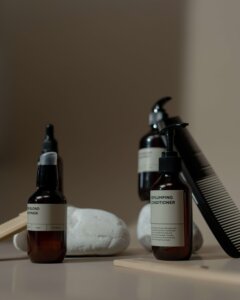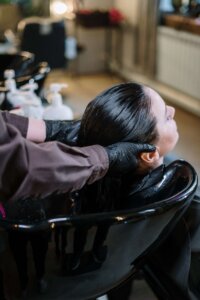The Science of Shampooing

Shampooing seems like a simple and routine task, but did you know that there’s a science behind it? Washing your hair the right way is crucial for maintaining healthy, luscious locks. The right techniques and products can make a significant difference in the condition and appearance of your hair. In this beauty blog, we’ll delve into the science of shampooing and explore the proper methods to cleanse your hair effectively while preserving its natural moisture and shine.
Understanding the Science of Shampooing:
Before we delve into the steps, let’s understand the science behind shampooing. Shampoos are formulated with surfactants, which are responsible for removing dirt, oil, and product buildup from your hair and scalp. These surfactants create a lather that traps and lifts away impurities. However, excessive use of harsh surfactants can strip your hair of its natural oils, leading to dryness and irritation.
Choosing the Right Shampoo:
Selecting the right shampoo is the foundation of a successful hair care routine. Consider your hair type, concerns, and scalp condition. If you have oily hair, opt for a clarifying shampoo to remove excess sebum and buildup. For dry or damaged hair, choose a moisturizing shampoo with nourishing ingredients like shea butter or argan oil. Individuals with sensitive scalps should look for sulfate-free or mild shampoos to minimize irritation.
The Proper Technique:
Pre-Wash Preparations:
Before jumping into the shower, gently brush your hair to remove any knots or tangles. This reduces breakage and makes it easier for the shampoo to distribute evenly.
Wet Your Hair Thoroughly:
Once in the shower, wet your hair thoroughly with lukewarm water. Hot water can strip your hair of its natural oils, leading to dryness. Lukewarm water opens up the hair cuticles, allowing the shampoo to cleanse more effectively.
Apply the Shampoo:
Dispense a quarter-sized amount of shampoo into your palm and rub your hands together to create a lather. Apply the shampoo to your scalp, focusing on the roots and the area behind your ears. Gently massage your scalp using your fingertips, not your nails. This stimulates blood circulation and promotes a healthy scalp.
Work the Lather Down the Hair:
As you massage your scalp, the lather will naturally work its way down your hair. Avoid vigorously rubbing the length of your hair, as this can lead to tangling and damage. The lather will cleanse your strands as it flows down, so there’s no need for excessive scrubbing.
Rinse Thoroughly:
After shampooing, rinse your hair thoroughly with cool water. Coldwater seals the hair cuticles, promoting shine and reducing frizz. Make sure there’s no shampoo residue left on your scalp or hair.
Condition Carefully:
After shampooing, follow up with a conditioner suitable for your hair type. Apply the conditioner to the mid-lengths and ends of your hair, avoiding the scalp. Let it sit for a few minutes to allow the ingredients to penetrate your hair, then rinse with cool water.
Towel Dry Gently:
When you step out of the shower, resist the temptation to vigorously rub your hair with a towel. Instead, gently blot or squeeze out excess water using a soft microfiber towel or an old t-shirt. Vigorous rubbing can lead to hair breakage and frizz.
Air Dry or Use Heat Protectants:
If possible, allow your hair to air dry. If you must use heat styling tools, apply a heat protectant spray to shield your hair from damage.

Conclusion:
Mastering the science of shampooing is a game-changer for your hair care routine. By choosing the right shampoo, applying it correctly, and following up with the appropriate conditioner, you can maintain healthy, shiny, and beautiful hair. Remember, it’s not just about lathering up and rinsing off—each step plays a crucial role in preserving your hair’s natural moisture and vitality. Elevate your hair care routine with this scientific approach to shampooing, and enjoy the benefits of luscious, radiant locks every day.

